each用法详解
each和every的区别及用法
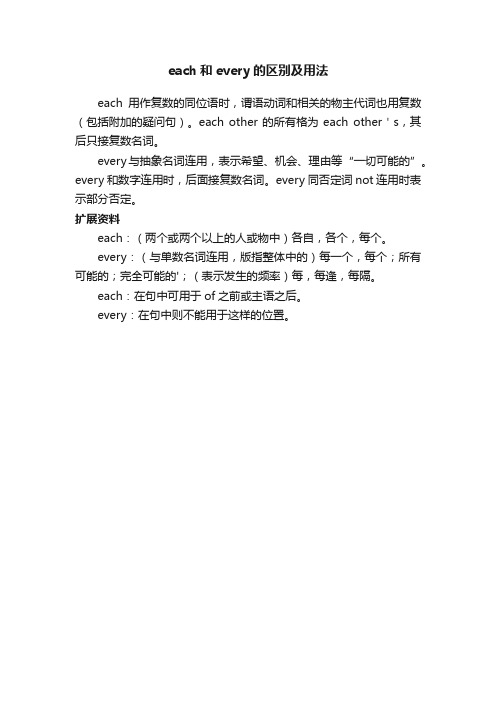
each和every的区别及用法
each用作复数的同位语时,谓语动词和相关的物主代词也用复数(包括附加的疑问句)。
each other的所有格为each other's,其后只接复数名词。
every与抽象名词连用,表示希望、机会、理由等“一切可能的”。
every和数字连用时,后面接复数名词。
every同否定词not连用时表示部分否定。
扩展资料
each:(两个或两个以上的人或物中)各自,各个,每个。
every:(与单数名词连用,版指整体中的)每一个,每个;所有可能的;完全可能的';(表示发生的频率)每,每逢,每隔。
each:在句中可用于of之前或主语之后。
every:在句中则不能用于这样的位置。
each every区别及用法
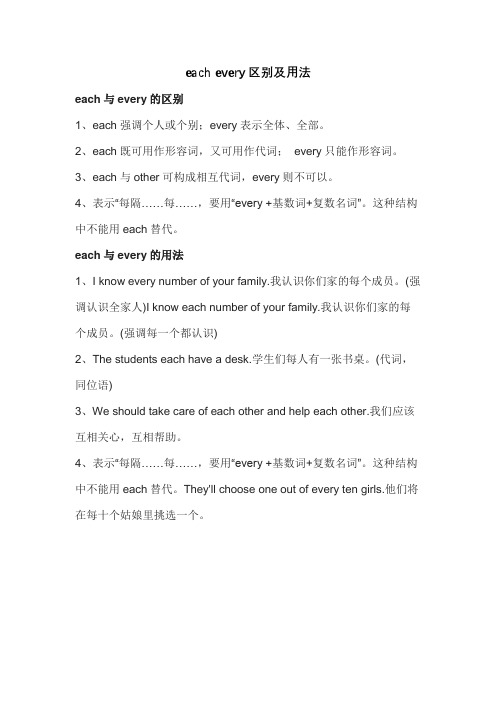
each every区别及用法
each与every的区别
1、each强调个人或个别;every表示全体、全部。
2、each既可用作形容词,又可用作代词;every只能作形容词。
3、each与other可构成相互代词,every则不可以。
4、表示“每隔……每……,要用“every +基数词+复数名词”。
这种结构中不能用each替代。
each与every的用法
1、I know every number of your family.我认识你们家的每个成员。
(强调认识全家人)I know each number of your family.我认识你们家的每个成员。
(强调每一个都认识)
2、The students each have a desk.学生们每人有一张书桌。
(代词,同位语)
3、We should take care of each other and help each other.我们应该互相关心,互相帮助。
4、表示“每隔……每……,要用“every +基数词+复数名词”。
这种结构中不能用each替代。
They'll choose one out of every ten girls.他们将在每十个姑娘里挑选一个。
each,every的用法

each,every的用法一、引言在英语学习中,我们经常会遇到一些词汇或短语,比如"each"和"every",它们虽然看似相似,但在实际使用中却有不同的含义和用法。
本文将详细解释这两个词汇的基本意义,并给出了一些例句来帮助理解它们的正确用法。
二、每个、每一个1. "each"和 "every" 都可表示“每个”或“每一个”的概念。
然而,在具体用法中存在一些差异。
a) "Each" 侧重于将一个集合分成各个独立的个体,并将注意力放在其中的每一个上。
例如:- Each student must bring their own textbooks to class.(每位学生都必须自带教科书来上课。
)- The teacher gave each student a book as a gift.(老师给每位学生赠送了一本书作为礼物。
)b) "Every" 强调整体中的所有成员,没有遗漏。
它可以理解为表示全面性更强的“所有”或“全部”。
例如:- Every student in the class passed the exam.(班上的每位学生都通过了考试。
)- She visits her grandmother every Sunday without fail.(她每个星期天都必定去拜访她的祖母。
)2. 使用上的注意点a) 在描述数量不确定的事物时,我们通常使用 "each" 而不是 "every"。
例如:- Each student needs to complete the assignment individually.(每个学生都需要独立完成作业。
)b) 当强调同一集合中每个成员时,我们倾向于使用 "each" 而非 "every" 。
every和each区别 常见八种情况下的用法
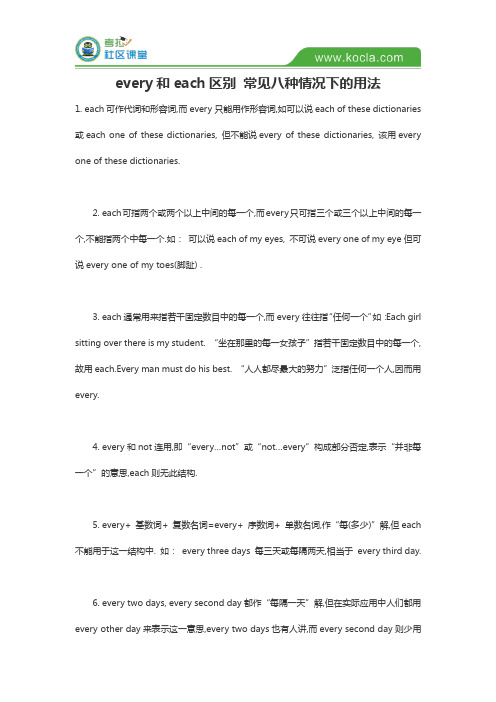
every和each区别常见八种情况下的用法1. each可作代词和形容词,而every只能用作形容词,如可以说each of these dictionaries 或each one of these dictionaries, 但不能说every of these dictionaries, 该用every one of these dictionaries.2. each可指两个或两个以上中间的每一个,而every只可指三个或三个以上中间的每一个,不能指两个中每一个.如:可以说each of my eyes, 不可说every one of my eye但可说every one of my toes(脚趾) .3. each通常用来指若干固定数目中的每一个,而every往往指“任何一个”如:Each girl sitting over there is my student. “坐在那里的每一女孩子”指若干固定数目中的每一个,故用each.Every man must do his best. “人人都尽最大的努力”泛指任何一个人,因而用every.4. every和not连用,即“every…not”或“not…every”构成部分否定,表示“并非每一个”的意思,each则无此结构.5. every+ 基数词+ 复数名词=every+ 序数词+ 单数名词,作“每(多少)”解,但each 不能用于这一结构中. 如:every three days 每三天或每隔两天,相当于every third day.6. every two days, every second day都作“每隔一天”解,但在实际应用中人们都用every other day来表示这一意思,every two days也有人讲,而every second day则少用的.7. 也可以说every few days, 相当于汉语的“隔些日子”.8. each 可以与other构成固定的搭配,即each other意思为“彼此、相互、互相”的意思,而every则不能.。
each与every用法区别

Each和Every的区别each与every都有“每个”的意思,但二者含义及语法功能不同,主要区别是:1.each既可用作形容词,又可用作代词,在句中可以作定语,主语、宾语、同位语、状语等。
Each student has his own dictionary . (形容词,定语)Each has hi s good point . (代词,主语)Our head teacher had a talk with each of us . (代词,宾语)The students each have a desk . (代词,同位语)The children can have a bag each . (副词,状语)2. each与every都可用作形容词,在句中作定语,但each更强调个人或个别,every更强调全体或全部。
比较:I know each number of your family .I know every number of your family .3. each指两个或两个以上的人或事物中的“每个”;every是指许多人或事物的“全体”,与all的意思相近。
试译:这条街上每边都有很多商店。
[误]There are many shops on every side of the street .[正]There a re many shops on each side of the street .我给她父母每人一件礼物。
[误]I gave a present to every one of her parents .[正]I gave a present to each of her parents .4. 指上下文提到过的确定数目中的“每一个”时,要用each;如果上下文没有提及时,不能用each,要用everyone等。
试译:我认为这三个答案个个都正确。
[误]I think ever y answer of the three is right .[正]I think each of the three answers is right .我看见人人都忙着工作。
each作代词的用法
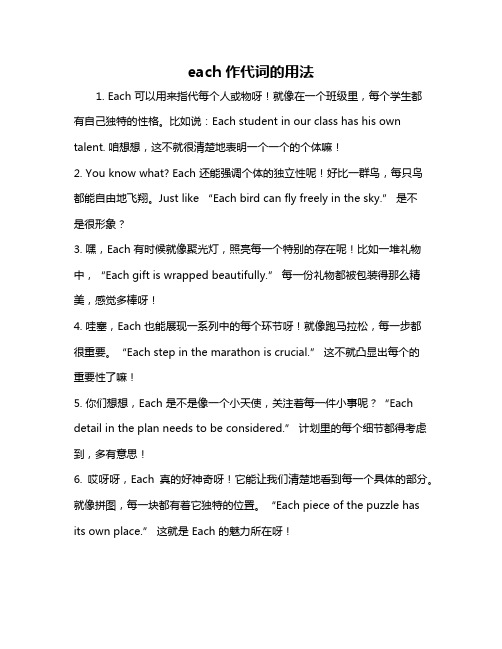
each作代词的用法
1. Each 可以用来指代每个人或物呀!就像在一个班级里,每个学生都
有自己独特的性格。
比如说:Each student in our class has his own talent. 咱想想,这不就很清楚地表明一个一个的个体嘛!
2. You know what? Each 还能强调个体的独立性呢!好比一群鸟,每只鸟都能自由地飞翔。
Just like “Each bird can fly freely in the sky.” 是不
是很形象?
3. 嘿,Each 有时候就像聚光灯,照亮每一个特别的存在呢!比如一堆礼物中,“Each gift is wrapped beautifully.” 每一份礼物都被包装得那么精美,感觉多棒呀!
4. 哇塞,Each 也能展现一系列中的每个环节呀!就像跑马拉松,每一步都
很重要。
“Each step in the marathon is crucial.” 这不就凸显出每个的
重要性了嘛!
5. 你们想想,Each 是不是像一个小天使,关注着每一件小事呢?“Each detail in the plan needs to be co nsidered.” 计划里的每个细节都得考虑到,多有意思!
6. 哎呀呀,Each 真的好神奇呀!它能让我们清楚地看到每一个具体的部分。
就像拼图,每一块都有着它独特的位置。
“Each piece of the puzzle has its own place.” 这就是 Each 的魅力所在呀!
结论:Each 作为代词的用法真的又多样又实用,大家一定要好好掌握呀!。
every和each用法上的区别

every和each用法上的区别Each与every都有“每个”的意思,但二者含义及语法功能不同,主要区别是:1.each可作代词和形容词,而every只能用作形容词,如可以说each of these naries或each one of naries,但不能说every of these naries,该用every one of these naries。
2.each可指两个或两个以上中间的每一个,而every只可指三个或三个以上中间的每一个,不能指两个中每一个。
如:可以说each of my eyes,不可说every one of my eye但可说every one of my toes(脚趾)。
3.each通常用来指若干固定数目中的每一个,而every往往指“任何一个”如:Each girl sitting over there is my student.“坐在那里的每一女孩子”指若干固定数目中的每一个,故用each。
Every man must do his best.“人人都尽最大的努力”泛指任何一个人,因而用every。
4.every和not连用,即“every…not”或“not…every”构成局部否定,表示“并非每个”的意义,each则无此布局。
5.every+基数词+复数名词=every+序数词+单数名词,作“每(多少)”解,但each不能用于这一结构中。
如:every three days每三天或每隔两天,相当于every third day。
6.every two days。
every second day都作“每隔一天”解,但在实践应用中人们都用every other day来表示这一意义,every two days也有人讲,而every second day则罕用的。
7.也可以说every few days,相当于汉语的“隔些日子”。
1.each既可用作形容词,又可用作代词,在句中可以作定语,主语、宾语、同位语、状语等。
Each 的用法

Each 的用法一、each作“各自的”,“每个的”解,作形容词用:1.There are many trees on each side of the river.河流两岸许多树。
2.Each element has some special properties.每种元素都有些特殊性质。
二、作“各自”、“每个”讲,作代词用:1.Each has his advantages.各人都有其优点。
2.He gave each of us a tool.他给我们每人一件工具。
三、作“各自地”讲,作副词用:1.Give them two books each.(=Give each of them tw o books.)给他们每个人两本书。
2.The students have ten books each.(=Each of the students has ten books.)这些学生每人有十本书。
3.Different kinds of waves have each the same threecharacteristics: amplitude,frequency and length.不同的波(各)都有三个相同的特性:幅度、频率和波长。
(each在此修饰主语waves)四、注意each作同位语的用法:1.They each put forward a proposal.他们每人提出一条建议。
(each此处紧挨代词they,是they的同位语)2.The workers are each of them hard-working.这些工人个个勤奋劳动。
(each of them整个形式名词做the worker s的同位语)注:同位语——一个名词(或其它形式)对另一个名词或代词进行修饰,限定或说明,这个名词(或其它形式)就是同位语。
同位语与被它限定的词的格要一致,并常常紧挨在一起。
五、each other作“互相”、“彼此”解:1.We help each other.我们互相帮助。
every和each的用法和区别

every和each的用法和区别
两者都有“每个”的意思,但用法不同:
(1)each具有代词、形容词和副词的功能,every只有形容词的功能。
(2)each指两个或两个以上的人或事物中的“每个”;every是指三个以上的人或事物的“全体”,和all的意思相近,如:
He gave a book to each of his parents.
他给他父母各送了一本书。
Every comrade was there and each did his work.
每个同志都在那儿,各人做各人的工作。
(3)every总是修饰单数名词,后接单数动词。
Every man and woman knows that.
每个男人和女人都知道那事。
(4)each作为形容词,修饰单数名词,接单数动词。
作为代词,单独使用,接单数动词;放在复数名词和代词后作同位语,接复数动词。
each of them后可接单数或复数动词,如:Each man carries his own bag.(修饰单数名词)各人背自己的包。
We each have our own office. (作We的同位语)我们各有各的办公室。
Each carries his own bag.(代词)各人背自己的包。
Each of them are/is here.(代词)他们每个人都在这儿。
(5)代表each和every的物主代词可以用his,也可以用their。
如:Each carried their/his own bag.各人背他们/他自己的包。
each的用法
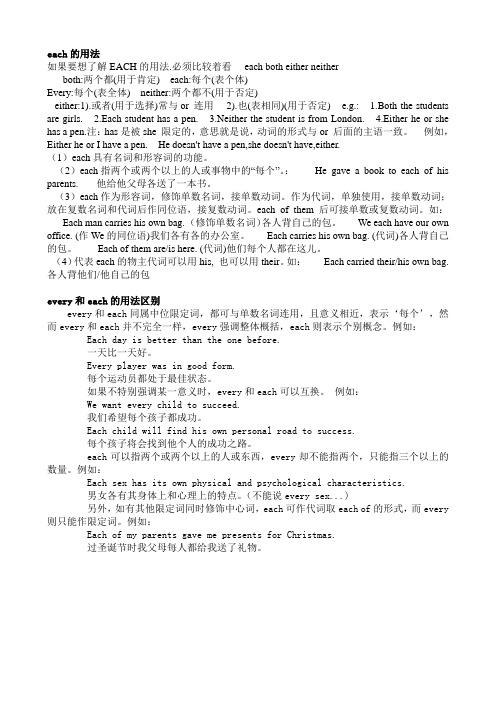
each的用法如果要想了解EACH的用法.必须比较着看 each both either neitherboth:两个都(用于肯定) each:每个(表个体)Every:每个(表全体) neither:两个都不(用于否定)either:1).或者(用于选择)常与or 连用 2).也(表相同)(用于否定) e.g.: 1.Both the students are girls. 2.Each student has a pen. 3.Neither the student is from London. 4.Either he or she has a pen.注:has是被she 限定的,意思就是说,动词的形式与or 后面的主语一致。
例如,Either he or I have a pen. He doesn't have a pen,she doesn't have,either.(1)each具有名词和形容词的功能。
(2)each指两个或两个以上的人或事物中的“每个”。
: He gave a book to each of his parents. 他给他父母各送了一本书。
(3)each作为形容词,修饰单数名词,接单数动词。
作为代词,单独使用,接单数动词;放在复数名词和代词后作同位语,接复数动词。
each of them后可接单数或复数动词。
如: Each man carries his own bag. (修饰单数名词)各人背自己的包。
We each have our own office. (作We的同位语)我们各有各的办公室。
Each carries his own bag. (代词)各人背自己的包。
Each of them are/is here. (代词)他们每个人都在这儿。
(4)代表each的物主代词可以用his, 也可以用their。
如: Each carried their/his own bag. 各人背他们/他自己的包every和each的用法区别every和each同属中位限定词,都可与单数名词连用,且意义相近,表示‘每个’,然而every和each并不完全一样,every强调整体概括,each则表示个别概念。
Each, every, either, everyone和every one的用法区别详解
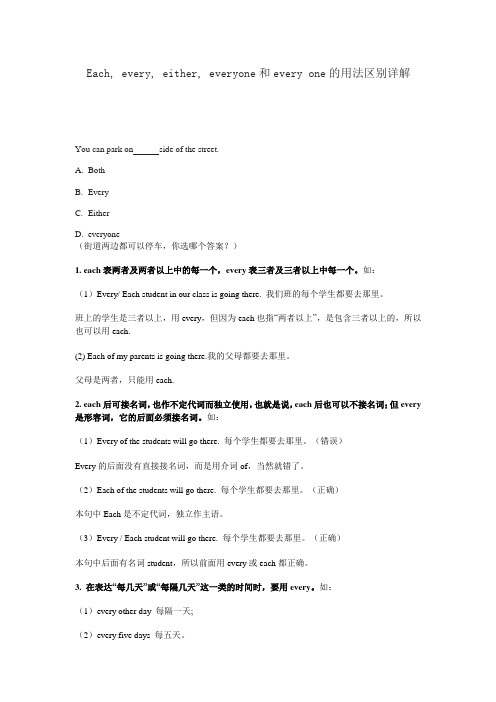
Each, every, either, everyone和every one的用法区别详解You can park on side of the street.A.BothB.EveryC.EitherD.everyone(街道两边都可以停车,你选哪个答案?)1. each表两者及两者以上中的每一个,every表三者及三者以上中每一个。
如:(1)Every/ Each student in our class is going there. 我们班的每个学生都要去那里。
班上的学生是三者以上,用every,但因为each也指“两者以上”,是包含三者以上的,所以也可以用each.(2) Each of my parents is going there.我的父母都要去那里。
父母是两者,只能用each.2. each后可接名词,也作不定代词而独立使用,也就是说,each后也可以不接名词;但every 是形容词,它的后面必须接名词。
如:(1)Every of the students will go there. 每个学生都要去那里。
(错误)Every的后面没有直接接名词,而是用介词of,当然就错了。
(2)Each of the students will go there. 每个学生都要去那里。
(正确)本句中Each是不定代词,独立作主语。
(3)Every / Each student will go there. 每个学生都要去那里。
(正确)本句中后面有名词student,所以前面用every或each都正确。
3. 在表达“每几天”或“每隔几天”这一类的时间时,要用every。
如:(1)every other day 每隔一天;(2)every five days 每五天。
each与every的用法
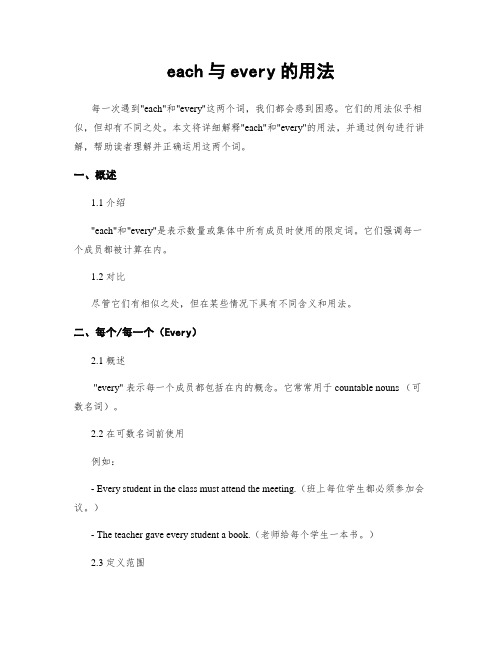
each与every的用法每一次遇到"each"和"every"这两个词,我们都会感到困惑。
它们的用法似乎相似,但却有不同之处。
本文将详细解释"each"和"every"的用法,并通过例句进行讲解,帮助读者理解并正确运用这两个词。
一、概述1.1 介绍"each"和"every"是表示数量或集体中所有成员时使用的限定词。
它们强调每一个成员都被计算在内。
1.2 对比尽管它们有相似之处,但在某些情况下具有不同含义和用法。
二、每个/每一个(Every)2.1 概述"every" 表示每一个成员都包括在内的概念。
它常常用于countable nouns (可数名词)。
2.2 在可数名词前使用例如:- Every student in the class must attend the meeting.(班上每位学生都必须参加会议。
)- The teacher gave every student a book.(老师给每个学生一本书。
)2.3 定义范围与整体相关联时, "every" 可以表示连续时间或无限重复。
例如:- Every day, I go for a run in the park.(我每天去公园跑步。
)- We meet every Tuesday for our book club.(我们每周二聚会开读书小组。
)三、每一/每个(Each)3.1 概述"each" 也表示每一个成员都包括在内,但它专注于个体之间的差异和独立性。
与 "every" 不同, "each" 更强调个人的区别。
3.2 用于可数名词例如:- Each student is responsible for their own project.(每位学生对自己的项目负责。
each和every的区别及用法例句

each和every的区别及用法例句
1、every是首先心中想着总体,然后考虑全部个体; each是首先考虑总体,然后一个一个地考虑个体。
2、each在句中可用于of之前或主语之后; 而every在句中则不能用于这样的位置。
3、every后面的动词永远是单数形式; each在名词之前动词用单数形式,在主语之后。
扩展资料
例句:
They walk their dogs every day.
他们每天遛狗。
You need to practise every day.
你需要每天练习。
She's late for work every day.
她每天上班都迟到。
Each answer is worth 20 points.
每题为20分。
Each order is coded separately.
每份订单都单独编号。
We drank a whole bottle each.
我们每人都喝了整整一瓶。
15 Each 和 every 的用法区别
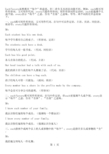
如:
Each student has his own desk.
每个学生都有自己的桌子。(形容词,定语)
The students each have a desk.
学生们每人有一张书桌。(代词,同位语)
Each has his good point.
各人有各自的优点。(代词,主语)
�
Our head teacher had a talk with each of us.
我们的班主任与我们每个人都谈了话。(代词,宾语)
The children can have a bag each.
孩子们每人可带一只提包。(副词,状语)
Every member has a share in the profits made by the company.
他们将在每十个姑娘里挑选一个。
We hand in our homework every three days.
我们每隔两天(每三天)交一次作业。
注意:“每三天或每隔两天”,也可以写作“every third day”,即,若用序数词时,后接单数名词。再如every four weeks / fourth week(每四周/每隔三周),every other day / second day / two days(每隔一天),every other line(每隔一行)等。
如:
Each / Each person / Every person is living a happy life now.
人人都过着幸福生活。
Each of them are / is wearing full dress.
他们个个都身着盛装。
each none all both的区别用法

each none all both的区别用法摘要:1.概述:介绍each、none、all和both的区别与用法2.each的用法:强调个人或个别,可用作形容词和代词,与other构成相互代词3.none的用法:表示三者或三者以上的人或物中没有一个,作主语时,谓语动词用单数4.all的用法:表示全体、全部,作主语时,谓语动词用复数5.both的用法:表示两者都,作主语时,谓语动词用单数6.总结:回顾每个词的用法和区别,提供实用建议正文:在日常生活中,我们经常会遇到一些表示数量或范围的英语词汇,如each、none、all和both。
这些词汇在用法上有一定的区别,下面我们就来详细了解一下它们的含义和用法。
首先,我们来谈谈each。
each的意思是“每;每个”,它强调个人或个别。
each可以用作形容词,修饰单数名词,如:each student(每个学生)。
同时,它也可以用作代词,表示每一个,如:I know each student in our class(我知道我们班上的每一个学生)。
此外,each与other可构成相互代词,表示彼此之间的差异,如:Each knows the other"s secret(彼此都知道对方的秘密)。
接下来是none。
none表示三者或三者以上的人或物中没有一个,强调不存在任何一个人或物。
当none作主语时,谓语动词用单数,如:None of them likes coffee(他们都不喜欢咖啡)。
none通常用于否定句中,表示没有人或物具有某种特征。
然后是all。
all表示全体、全部,强调整体性。
当all作主语时,谓语动词用复数,如:All of the students are participating in the activity(所有学生都参与了活动)。
all表示所有人或物都具有某种特征,如:All are equal in the eyes of the law(在法律面前,所有人都是平等的)。
each和one的用法及例句
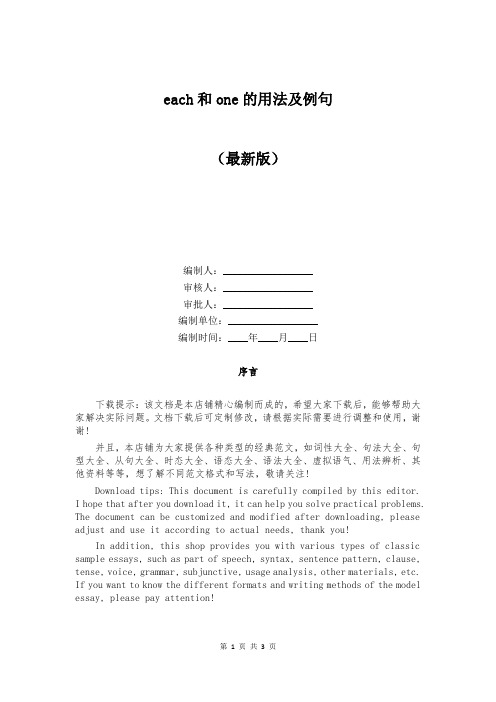
each和one的用法及例句(最新版)编制人:__________________审核人:__________________审批人:__________________编制单位:__________________编制时间:____年____月____日序言下载提示:该文档是本店铺精心编制而成的,希望大家下载后,能够帮助大家解决实际问题。
文档下载后可定制修改,请根据实际需要进行调整和使用,谢谢!并且,本店铺为大家提供各种类型的经典范文,如词性大全、句法大全、句型大全、从句大全、时态大全、语态大全、语法大全、虚拟语气、用法辨析、其他资料等等,想了解不同范文格式和写法,敬请关注!Download tips: This document is carefully compiled by this editor.I hope that after you download it, it can help you solve practical problems. The document can be customized and modified after downloading, please adjust and use it according to actual needs, thank you!In addition, this shop provides you with various types of classic sample essays, such as part of speech, syntax, sentence pattern, clause, tense, voice, grammar, subjunctive, usage analysis, other materials, etc. If you want to know the different formats and writing methods of the model essay, please pay attention!each和one的用法及例句1.each是“每一个”的意思,把一些东西或人一个个加以考虑时可以用它。
each of every of区别及用法(一)
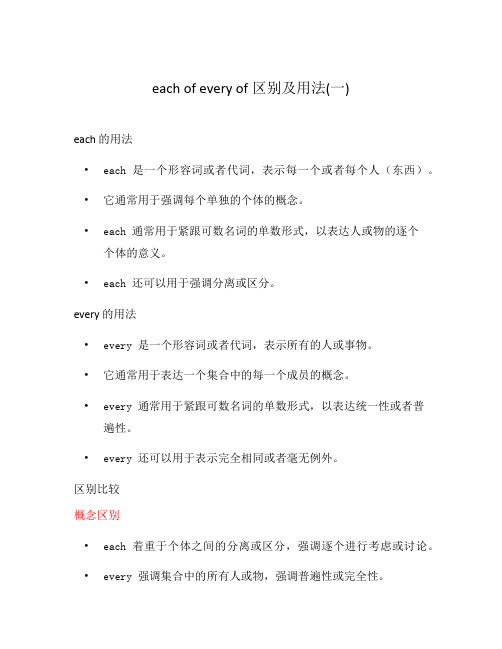
each of every of区别及用法(一)each 的用法•each 是一个形容词或者代词,表示每一个或者每个人(东西)。
•它通常用于强调每个单独的个体的概念。
•each 通常用于紧跟可数名词的单数形式,以表达人或物的逐个个体的意义。
•each 还可以用于强调分离或区分。
every 的用法•every 是一个形容词或者代词,表示所有的人或事物。
•它通常用于表达一个集合中的每一个成员的概念。
•every 通常用于紧跟可数名词的单数形式,以表达统一性或者普遍性。
•every 还可以用于表示完全相同或者毫无例外。
区别比较概念区别•each 着重于个体之间的分离或区分,强调逐个进行考虑或讨论。
•every 强调集合中的所有人或物,强调普遍性或完全性。
语法用法•each 通常用于可数名词的单数形式,表达人或物的逐个个体的意义。
–例如:Each student needs to submit their own essay.–译文:每个学生都需要提交自己的论文。
•every 通常用于可数名词的单数形式,表达统一性或普遍性。
–例如:Every child deserves a good education.–译文:每个孩子都应该得到良好的教育。
强调程度•each 和 every 都可以用于强调,但用法上有所不同。
•each 强调每个单独的个体,每一个都很重要。
•every 强调整体,每一个成员都应该受到同等对待。
•例如:Each student has their own strengths and weaknesses.–译文:每个学生都有自己的优点和缺点。
–例如:Every student should be treated fairly.–译文:每个学生都应该受到公平对待。
强调个体•each 可用于强调个体之间的差异或重要性。
•例如:He gave each student a medal.–译文:他给了每个学生一枚奖章。
- 1、下载文档前请自行甄别文档内容的完整性,平台不提供额外的编辑、内容补充、找答案等附加服务。
- 2、"仅部分预览"的文档,不可在线预览部分如存在完整性等问题,可反馈申请退款(可完整预览的文档不适用该条件!)。
- 3、如文档侵犯您的权益,请联系客服反馈,我们会尽快为您处理(人工客服工作时间:9:00-18:30)。
When each follows a plural subject, however, the verb and subsequent pronouns remain in the plural: The apartments each have their own private entrances(not has its own private entrance). But when each follows the verb with we as its subject, the rule has an exception. One may say either We boys have each our own room or We boys have each his own room, though the latter form may strike readers as stilted (生硬的, 不自然的, 矫揉造作的).
--American Heritage Dictionary…
6. Each, pronoun, referring to a plural subject, but following the verb. Copperud 1970 reports the agreement of Fowler 1965 and Bernstein 1965 that when each follows the verb, the reference to the subject should be singular; Copperud gives this example:
We are each responsible for his own family.
Not only does the example seem awkward, but the Merriam-Webster files have not a single example of the prescribed form with the singular. Actual usage seems to prefer the plural:
.. . strong unsubsidized lines can each carry their
share of money-losing routes—Time, 17 May 1954 Bernstein and Fowler appear to be agreeing on theory only; the examples they present, of course, have plural pronouns. Our files have very few examples of this particular construction, which suggests this problem may be encountered less often than some of the others discussed in this article.
--Webster’s Dictionary of English Usage, 1989, p.378
补充关于each做主语后动词和代词的一致:
In the most formal speech and writing, singular verbs and pronouns occur more frequently than plural: Each member ... had his own special interests. The use of plural forms, especially plural pronouns, has been increasing in the United States, partially because of the desire to avoid using he or his to refer to a female.
---Random House Webster’s…。
